Choose the best answer to complete each one below.
How ______ do you go swimming after school? – Once a week.
-
A.
many
-
B.
much
-
C.
often
-
D.
far
- Dịch nghĩa câu đề bài để hiểu được ngữ cảnh của câu.
- Dịch nghĩa các đáp án và lần lượt điền các đáp án vào chỗ trống để chọn được đáp án phù hợp nhất tạo thành câu có nghĩa.
How ________ do you go swimming after school? – Once a week.
(Bạn đi bơi sau giờ học _________? – 1 lần/ tuần.)
- How many + danh từ đếm được số nhiều: Bao nhiêu – Hỏi về số lượng
- How much + danh từ không đếm được: Bao nhiêu– Hỏi về số lượng
- How often: thường xuyên như thế nào - Hỏi về tần suất
- How far: xa bao nhiêu – Hỏi về khoảng cách
=> How often do you go swimming after school? – Once a week.
(Bạn đi bơi sau giờ học thường xuyên như thế nào? – 1 lần/ tuần.)
Đáp án : C

Các bài tập cùng chuyên đề
3. Fill the blanks with usually, sometimes or never.
(Điền vào chỗ trống với “thường xuyên”, “thỉnh thoảng” hoặc “không bao giờ.”)
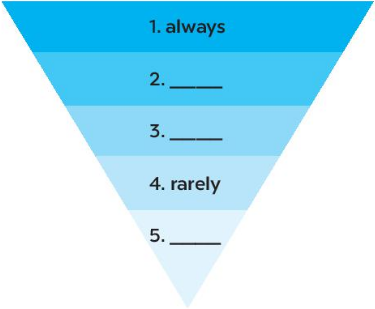
Write a sentence with one of these adverbs.
(Viết một câu với một trong những trạng từ này.)
4. Choose the correct answer A or B to complete each sentence.
(Chọn đáp án đúng A hoặc B để hoàn thành câu.)
1. I ________ late on Saturdays.
A. get up usually
B. usually get up
2. My mum ________ to work late.
A. rarely goes
B. goes rarety
3. ________ at weekends?
A. Do you often travel
B. Often do you travel
4. What kind of music________ ?
A. usually does Susan listen to
B. does Susan usually listen to
5. When________ go on holiday each year?
A. do you usually
B. you usually
5. Work in pairs. Make questions, and then interview your partner.
(Làm việc theo cặp. Tạo câu hỏi và sau đó phỏng vấn bạn của em.)
1. you / often / ride your bicycle / to school
2. you / sometimes / study / in the school library
3. you / like / your new school!
4. your friends / always / go to school /with you
5. you / usually / do homework / after school
5. Put the adverb in brackets in the correct place in each sentence.
(Đặt trạng từ trong ngoặc vào vị trí đúng trong mỗi câu.)
1. I remember to do my homework. (always)
2. Nick gets good marks in exams. (usually)
3. We do not see a rabbit in town. (often)
4. I read in bed at night. (rarely)
5. Do you sing in the shower? (sometimes)
Exercise 4. Check the meanings of the words in the box. Then watch or listen again and complete the sentences.
(Kiểm tra nghĩa của các từ trong khung. Sau đó xem hoặc nghe lại và hoàn thành câu.)
|
sometimes never always usually often normally |
1. My work…………...starts early.
2. I …………... have breakfast.
3. I'm …………...late for school.
4. The children…………...go to bed at about 9.
5. I…………...... go to bed before 11.
6. I…………...watch TV or play video games.
Exercise 5. Complete the chart with the words in the box in exercise 4. Then choose the correct words in the Rules 1 – 2.
(Hoàn thành biểu đồ với các từ trong khung ở bài 4. Sau đó chọn từ đúng trong Quy luật 1 – 2.)

|
RULES |
|
Adverbs of frequency come… 1. before/ after the verb be. 2. before/ after other verbs. |
Exercise 6. USE IT! Write four true and two false sentences about your routines. Then work in pairs and listen to your partner's sentences. Say if you think they are true or false.
(Thực hành! Viết 4 câu đúng và 2 câu sai về thói quen hàng ngày của em. Sau đó làm việc theo cặp và nghe các câu của bạn em. Hãy nói em nghĩ những câu đó là đúng hay sai.)
A: I always get up at 5.30 a.m. (Tôi luôn thức dậy lúc 5:30 sáng.)
B: I think it's false. (Tôi nghĩ điều này sai.)
A: Yes, it is./No, it's true! (Vâng, sai thật./ Không, đúng đấy.)
3. THE LONGEST SENTENCE. Work in two teams. Each student says a word to make a team sentence. Use the adverbs of frequency in the box. Which team can make the longest sentence?
(Câu dài nhất. Làm việc theo hai đội. Mỗi học sinh nói một từ để tạo thành câu của đội mình. Sử dụng các trạng từ chỉ tần suất trong khung. Đội nào có câu dài nhất.)
|
never sometimes often usually always |
I – sometimes – go – to …
- You always go to school by bike. – Yes, that’s true.
(Bạn luôn đến trường bằng xe đạp. - Ừm, đúng vậy.)
- You are somtimes late for school. – Yes, that’s true.
(Bạn thỉnh thoảng đi học muộn. - Ừm, đúng vậy.)
- You usually help your mother with the housework. – No, that’s false.
(Bạn thường giúp mẹ làm việc nhà. – Không, sai rồi.)
a. Fill in the blanks. Listen and repeat.
(Điền vào chỗ trống. Nghe và lặp lại.)
| often never sometimes always rarely usually |
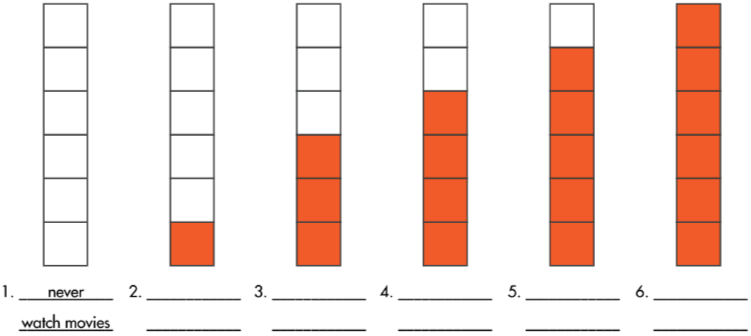
Write an activity under each adverb. Take turns using them in a sentence.
(Viết một hoạt động bên dưới mỗi trạng từ. Luân phiên sử dụng chúng trong một câu.)
I never watch movies.
(Tôi không bao giờ xem phim.)
b. Now, listen and fill in the blanks.
(Giờ thì, nghe và điền vào chỗ trống.)
1. Lisa____________goes to the bookstore on Fridays.
2. Max____________plays video games when he gets home from school.
3. Max____________plays soccer on the weekends.
4. Lisa____________rides her bike on Saturdays.
b. Fill in the blanks with the adverbs of frequency.
(Điền vào chỗ trống với các trạng từ chỉ tần suất.)

c. Look at the table and write the answers.
(Nhìn bảng và viết câu trả lời.)
1. How often does Jack go shopping?
(Jack thường đi mua sắm như thế nào?)
2. How often does Bobby do his homework?
(Bobby thường làm bài tập về nhà như thế nào?)
3. How often does Sarah play soccer?
(Sarah thường chơi bóng đá như thế nào?)
4. How often does Amanda have barbecues?
(Amanda thường tổ chức tiệc nướng như thế nào?)
|
Name |
Activity |
Frequency |
|
Jack |
go shopping |
rarely |
|
Bobby |
do homework |
always |
|
Sarah |
play soccer |
often |
|
Amanda |
have barbecues |
sometimes |
d. Now, ask your partner how often they do these activities.
(Giờ thì, hỏi bạn của em họ làm những hoạt động này thường xuyên như thế nào.)
What’s Your “Spirit Animal?”
(“Linh vật” của bạn là gì?)
a. You’re doing a quiz about your free time activities to find out your “spirit animal”. Work in pairs. Add three more activities and then ask your friend to complete the quiz.
(Em đang làm một bảng câu đố về các hoạt động trong thời gian rảnh rỗi để tìm ra “linh vật” của em. Làm việc theo cặp. Thêm ba hoạt động nữa và sau đó hỏi bạn em để hoàn thành câu hỏi.)
- How often do you do yoga?
(Bạn tập yoga thường xuyên như thế nào?)
- I rarely do yoga.
(Tôi hiếm khi tập yoga.)
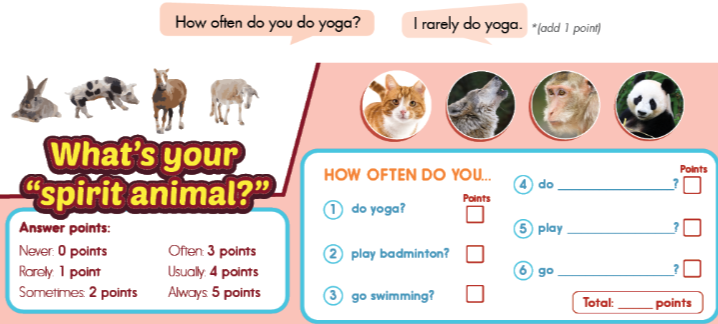
Ask and answer.
(Hỏi và trả lời.)
- How often do you go running?
(Bạn chạy bộ thường xuyên như thế nào?)
- I rarely go running.
(Tôi hiếm khi chạy bộ.)
|
after school on the weekends in the afternoon in the mornings on Saturdays |

Advebs of frequency (Trạng từ chỉ tần suất)
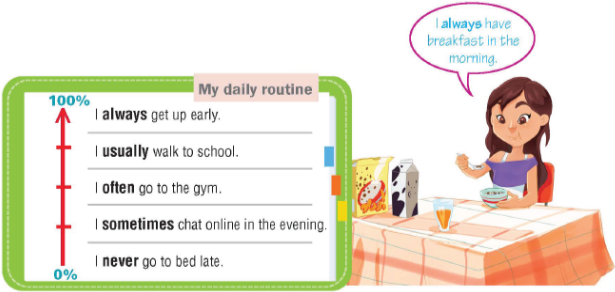
I always have breakfast in the morning.
(Tôi luôn ăn sáng vào buổi sáng.)
1. Read the theory box. Then write the correct adverb of frequency.
(Đọc khung lý thuyết. Sau đó viết trạng từ chỉ tần suất đúng.)
1. John ____________ (100%) walks to school.
2. Helen ____________ (25%) watches TV in the evening.
3. They ____________ (50%) do their homework after lunch.
4. He is ____________ (0%) late for school.
5. My dad ____________ (75%) has lunch at work.
2. Put the words in the correct order.
(Đặt các từ theo trật tự đúng.)
1. always/early/is/ for work/ He
2. She/late/ sometimes/ is
3. shower/ He / in the evening/ usually / takes/ a
4. on Sundays/ They/go/ often/to the park
3. Put a tick (✓) in the correct box. Then tell your partner.
(Đánh dấu vào ô đúng. Sau đó nói với bạn của em.)
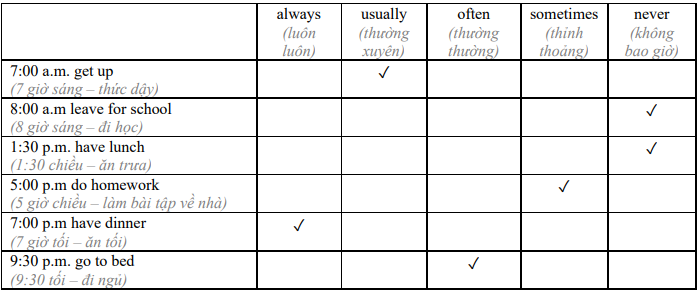
I usually get up at 7:00 a.m.
(Tôi thường thức dậy lúc 7 giờ sáng.)
D. Complete the sentences. Use words from the box to make true sentences about you.
(Hoàn thành câu. Sử dụng các từ trong khung để tạo thành câu đúng về em.)
| always never sometimes often usually |
1. I _______________ get up at 6 oclock.
2. I ________________ have breakfast before school.
3.I_________________do my homework after school.
4. I ________________go to bed at midnight.
E. Work in small groups. Choose one activity and one time and make a sentence. Say how often you do the activity. Take turns.
(Làm việc theo nhóm nhỏ. Chọn một hoạt động và một thời điểm và đặt một câu. Nói em làm hành động đó với tần suất như thế nào. Luân phiên nhau.)
|
Activity |
Adverb |
Time |
|
get up have breakfast go to school go home do homework go to bed |
never sometimes often usually always |
1:30 3:00 6:00 7:30 8:00 9:00 |
- I usually get up at 6 o’clock.
(Tôi thường ngủ dậy lúc 6 giờ sáng.)
2. Read and tell how you say the underlined words in the text below in your language.
(Đọc và nói em nói các từ được gạch dưới bằng ngôn ngữ của em như thế nào.)

A day in the life of a 6th Grader
Tommy
We have asked Tommy, a 6th grader - to describe his typical day. This is what he told us: At 6:45, Mom or Dad comes in and wakes me up (but I _________ get up immediately). At 7:00, I drag myself out of bed and into the shower. From 7:15 to 7:30, I grab some breakfast and then catch the bus to school. At 8:10, we arrive at school and I get ready for my first class. We _________learn about school activities, study skills, and spend time on thinking and reading activities. From 12:15 to 12:45 is our lunch time. After school, I take the bus home and get a snack. I first spend some time with my dog-Lucy and then relax for a while. Between 16:10 and 17:30, I _________ practice the flute or participate in one of my club activities. My family often has dinner at 19:00. This is the “we time” of the day. My whole family sits down together, at least on most days. After that, I usually spend about one or two hours doing my homework. From 21:30 to 22:00, I usually read a book in bed, then fall asleep.
6. Put the following words and phrases in correct order to make sentences.
(Đặt các từ và cụm từ sau theo đúng thứ tự để tạo thành câu.)
1. My grandmother / at home / always / is / in the evening/.
2. celebrate / my birthday / I / usually / with my friends /.
3. you / Sunday / What time / usually / do / on / get up /?
4. speak / We / our /in / Vietnamese / English class / hardly ever /.
5. always / The / six forty-five / arrives / school bus / at /.
Adverbs of frequency
(Trạng từ tần suất)
(Sắp xếp các từ để tạo thành câu.)
sometimes / watch / videos / We
-> We sometimes watch videos.
(Chúng tôi thỉnh thoảng xem video.)
1. football / plays / Robert / never
2. friendly /They / always / are
3. my / normally / homework /I / do
4. often / Marina and Julia / late / are
5. dinner / usually / have / We
6. class / your / Is /quiet / often / ?
1. * Underline the correct adverb of frequency.
(Gạch chân dưới trạng từ chỉ tần suất đúng.)
1. We always/never walk to school. (0%)
2. My mother usually/often goes to bed late (75%)
3. My brother sometimes/always does his homework. (100%)
4. Bao often/sometimes goes to football practice. (50%)
2. ** Rewrite the sentences. Put the adverbs of frequency in the corect place.
(Viết lại câu. Đặt trạng từ chỉ tần suất vào chỗ thích hợp.)
1. I get up at 7:00 a.m. (always)
______________________________________________
2. Fran chats online. (sometimes)
______________________________________________
3. Neil plays video games. (usually)
______________________________________________
4. John and Mark have breakfast. (never)
______________________________________________
3. *** Look at the table. Write sentences using the adverbs of frequency.
(Nhìn vào bảng sau. Viết câu bằng cách sử dụng các trạng từ chỉ tần suất.)
|
|
always |
often |
sometimes |
never |
|
Kate/walk to school |
|
|
✓ |
|
|
Bob/play football |
|
✓ |
|
|
|
Greg/study at night |
|
|
|
✓ |
|
Ann and Sue/ go to bed early |
✓ |
|
|
|
a. Unscramble the words
(Sắp xếp lại từ.)
1. tissommee
2. uyullas
3. nerve
4. tenfo
5. ayrerl
6. awlysa
b. Fill in the blanks with the correct adverbs of frequency
(Điền vào chỗ trống với các trạng từ chỉ tần suất.)

c. Look at the table. Fill in the blanks with the correct adverbs of frequency.
(Nhìn vào bảng. Điền vào chỗ trống với các trạng từ chỉ tần suất chính xác.)
|
play tennis (chơi quần vợt) |
do yoga (tập yoga) |
do martial arts (tập võ thuật) |
play hide and seek (chơi trốn tìm) |
play hopscotch (chơi lò cò) |
|
|
Julie |
50% |
90% |
0% |
70% |
10% |
|
Daniel |
90% |
0% |
100% |
50% |
10% |
1. Julie sometimes plays tennis with her brother on the weekends.
2. Julie plays hopscotch with her friends in the park.
3. Julie does yoga after school.
4. Daniel enjoys playing in the garden. He plays hide and seek with his little sister.
5. Daniel does martial arts in the evenings.
6. Daniel plays tennis with his best friend on Sundays.







Danh sách bình luận